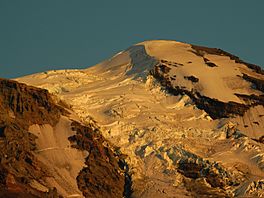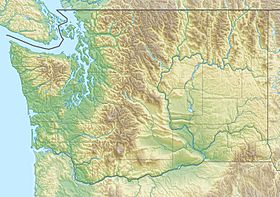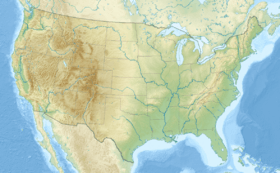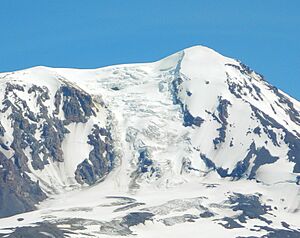Adams Glacier (Mount Adams) facts for kids
Quick facts for kids Adams Glacier |
|
|---|---|

Adams Glacier from the northwest
|
|
| Type | Mountain glacier |
| Coordinates | 46°13′2″N 121°30′42″W / 46.21722°N 121.51167°W |
| Area | 3.68 km2 (1.42 sq mi) in 2006 |
| Length | 2.5 miles (4.0 km) |
| Terminus | Moraines |
| Status | Retreating |
The Adams Glacier is a huge ice river found on the northwest side of Mount Adams. This mountain is a tall stratovolcano in the state of Washington, USA. The glacier is very important because much of its melting ice forms Adams Creek, which flows into the Cispus River.
It is the biggest glacier on Mount Adams. It is also the second largest glacier in the entire contiguous United States. It flows down from the mountain's icy top, which is over 12,000 feet (3,700 m) high. The glacier stretches for more than 2.5 miles (4.0 km) and ends at about 7,000 feet (2,100 m).
Contents
Exploring Adams Glacier
The Challenging Icefall
Between 11,800 and 9,200 feet (3,600 and 2,800 m), the Adams Glacier flows through a very steep and broken area called an icefall. This part of the glacier is full of large ice blocks, known as seracs. It can be a difficult place for climbers to navigate.
The first time anyone successfully climbed this glacier was in July 1945. The climbers were Fred Beckey, Dave Lind, and Robert Mulhall.
Where the Glacier Ends
Below 8,400 feet (2,600 m), the Adams Glacier spreads out. It forms a wide sheet of ice with five separate parts, called tongues. These ice tongues reach out to their ends, which are located between large piles of rock and dirt called moraines. On its easternmost tongue, the glacier ends at a small, ice-filled lake called a glacial tarn. This lake is located above a place known as High Camp.
How Glaciers Change Over Time
Glaciers like Adams Glacier can change in size over many years. The Adams Glacier has actually shrunk quite a bit. Between 1904 and 2006, its surface area decreased by 47%. This means it lost almost half of its ice cover during that time.
The Story Behind the Name
Naming Mount Adams' Glaciers
In 1901, Harry Fielding Reid was mapping Mount Adams and giving names to its glaciers. His guide and friend, Claude Ewing Rusk, wanted to name this large glacier "Reid Glacier" to honor Harry Reid.
However, Harry Reid did not want the glacier named after himself. He felt it was not right to put his own name on the map he was creating. Also, a group called the Mazamas was already trying to name a glacier on Mount Hood after him. Because of Reid's strong feelings, Rusk eventually agreed. He decided to name the glacier Adams Glacier instead.
See Also
 | Roy Wilkins |
 | John Lewis |
 | Linda Carol Brown |




